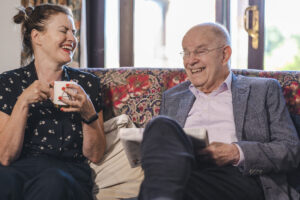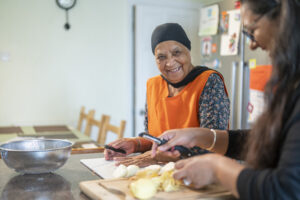
A team of our digital experts and social workers joined forces with the government to look at how digital innovation could help transform adult social care.
At the heart of this work, which saw us work with the Department of Health and Social Care (DHSC), was asking our residents and carers how the service could be improved for them.
It focused on care assessments and reviews as there is a national backlog – a backlog that is only expected to grow.
Could there be a digital answer to this problem?
Inna Dalton, Delivery Product Manager in the Digital Policy Unit at the Department of Health and Social Care, looks back on the three-month project and reveals its conclusion.
The project team
We came together last September as a multi-disciplinary team from the DHSC and Dorset Council. Together we pooled our specialist skills, which included service designers, user researchers, technical architects, product managers and social workers.
Our main task was to examine how we could reduce backlogs – to help reduce the current backlogs and meet the growing social care challenges.
Project summary
The backdrop to this innovative and experimental project was the charging reform set to affect every local authority in England from October. This has now been postponed.
These reforms would have required councils to track spend on care provision for adults.
This was expected to create additional demand for care needs and financial assessments, with one report estimating that an extra 200,000 care and financial assessments would be needed every year.
This new demand would add to an existing backlog, which has seen between 300,000 and 500,000 assessments nationally still on the waiting list.
A further rise in backlogs cannot be tackled by increases in workforce alone, especially as the adult social sector has challenges in retaining and recruiting more people.
This is why our team from DHSC partnered with Dorset Council – we wanted to combine expertise in design of services and digital products with local knowledge.
The aim was to find a different way to tackle waiting lists and the care assessments backlog.
Our focus was on user research
The main effort of the combined team went into user research – speak to the people who receive and provide the care. We wanted to understand the experiences of people who use the service, as well as those involved in its delivery. In the 12 weeks of the project, we conducted interviews with 40 participants including:
- social workers
- assessment support co-ordinators
- staff from the customer access team who take calls from Dorset residents
- managers of programmes from the local authority as well as voluntary sector and assisted living scheme
- unpaid carers
- adults receiving care.
We learned about the challenges that an unpaid carer faced when moving her mother from another council to Dorset. From her, we heard how long it took to be re-assessed and then to find care. 
Social workers told us how they found their daily jobs did not meet the expectations they had when they were doing their degree. They said most of their time was spent at computers instead of working with people.
We also heard the genuine concerns felt by staff in assisted living schemes who are working harder and harder while the needs of their users increase. They told us the number of hours they are paid for to provide support is also going down.
Developing a solution
To explore the problems our users shared with us, we looked at how the service could be designed differently.
We spent several weeks collating our user research and held a three-day workshop to better understand the problems and sketch out a proposal for redesigning the service.
By the end of day 3, we came up with a proposal, aimed at a specific type of service user, informed by our user research. We called them Alex. The main aspects of the proposal were:
- To improve Alex’s experience, we would need to reduce the instances of asking Alex to repeat their story from many to one
- To empower staff at Dorset Council, we would need to provide faster and better access to higher quality information about Alex’s history and needs
- To remove waiting lists for people like Alex, we would need to find a way of shortening their journey from several months to several weeks.
The digital concept of the proposal – Social Care Passport
Our concept was to develop a ‘Social Care Passport’ for Alex.
This would:
- Enable the service user to record and share their own story, perhaps even using their own voice
- Hold securely, and make accessible, records of interventions and encounters that Alex may have had with the health service or local community or voluntary organisations
- Allow the local authority and other trusted organisations and individuals to access a rich summary of Alex’s needs, making it possible to shorten the time from requesting care to getting it.
- Introduce transparency in the process: Users like Alex and their carers would be able to track what is happening. When is the next appointment to discuss the care package? When is the annual review? How is the current package working?
Conclusions – can the Social Passport be the answer?
Does this technology exist? We think that there are some elements in place. One of them is the Dorset Care Record (DCR), used by NHS and made available to Dorset Council through a link in the adult social care case management system.
Our work throughout the 12 weeks was valuable to Dorset Council, but more work is needed to take this proposal forward.
In the first instance, exploring and then further enhancing capability of the Dorset Care Record would be a logical step towards the vision of a better service for people like Alex.
There were many benefits of working with Dorset Council. DHSC staff in the team who don’t come in direct contact with people like Alex, learned far more about the challenges faced by councils and users.
By bringing two different organisations together, we were able to combine not just our knowledge but also learn from each other.
We were able to learn about people’s experiences of adult social care and find an honest and productive way of sharing our findings.
Now the project has concluded, we would like to have spoken to even more users as they are key to how we are going to improve adult social care.
We did not have time to create a prototype of the digital solution in this time limited project.
But we now have an idea that can provoke more thought to take us all forward and look at ways a digital solution can transform adult social care.

I have worked in communications for 25 years, first as a journalist and then in public and private sector public relations. From Southampton originally, I have lived in beautiful Dorset for the last two decades. My passion for Dorset has also turned into a passion for landscape photography. My other great loves are my family and Southampton Football Club.

